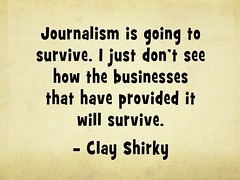If you’re a brand strategist, you have a point of view, an agenda, and a need to influence. You’re an activist for your brand. Today, brands must be seen as experts, and we claim that title through content marketing, which means producing content that informs your buyers and keeps them apprised of news and trends. Which makes content marketers journalists too, and with that, comes responsibility.

Not long ago, a few editors and I were discussing native advertising: paid content written by brands that is increasingly intertwined with articles produced by journalists. It’s clearly marked, but we wondered how often readers actually notice or question it. What role it will play in the future of digital marketing or journalism is uncertain, but I’m betting that news sites will increasingly turn to this type of advertising to support their businesses.

As editors, both present and former, my friends and I all understand the current financial state of the news business and the need to find new revenue streams. But we’re also loyal to the concept of the separation of church and state: Editorial must be independent of – and not influenced by – advertisers. The question of how or if we can maintain this state is a burning question, as we increasingly blur the lines in the creation of news and opinion.
Last week, the New York Times media reporter, David Carr, wrote a column about whether journalism and activism can be one and the same. In it, he questioned whether it’s acceptable that Glenn Greenwald, the Guardian journalist who broke the NSA leaks story, is also an activist with a distinct and vocal viewpoint of government and national security.
Greenwald countered that all real journalists have an agenda; Carr pointed out that a good journalist seeks truth, even if the facts discredit his viewpoint.
Why does this matter to content marketing? The lines aren’t blurring only between journalism and activism, but also between journalism and content marketing. Whether it’s the latest research about preventing heart attacks or how the government uses our data, readers need to trust that it’s authentic, accurate, and truthful. If we create content that is absurdly slanted or misleading, they’ll walk away. And we’ve just put our brand’s credibility at risk.
I believe that content marketers have a responsibility to act more like journalists, and less like advertisers. It’s one of the reasons that I prefer the moniker “brand journalist.”
In fact, this is not so great of a leap for the public relations department, which is often staffed by former journalists who are already used to negotiating the line between truth and persuasion.
The values that brand journalists need to hold and practice should be defined in a code of ethics. Both the Public Relations Society of America (PRSA) and the Word of Mouth Marketing Association (WOMMA) have codes of ethics, but I wonder if either is enough for the world we’re now entering. The Society of Professional Journalists (SPJ) has a code of ethics that’s a useful starting point, and there are many others used by the media. At least one content company has made a stab at a brand journalism code of ethics: Contently produced a reasonably good attempt last summer.
But the blurring of the lines also means that the content we create – whether it’s news, news analysis or the identification of trends – must hold up to tough scrutiny. The content we produce should be thoroughly researched, our facts backed up by data, our work meticulously edited by someone with an objective eye and evaluated through the lens of a strong code of ethics.
Over time, I expect marketing departments will evolve to operate more like newsrooms, staffed by people with a set of skills and values held by journalists. Of course, brand journalists can never operate like traditional journalists, covering breaking news or uncovering government abuse, nor do I expect them to fulfill that role.
But, brand journalists can cover developments that have the potential to help readers. By keeping our audiences informed, we can not only provide a service to society and fill gaps in reporting that result from budget cuts, but also establish the credibility of our brands.
Our success, though, will depend on how seriously we view our responsibility to be honest, accurate and ethical.




